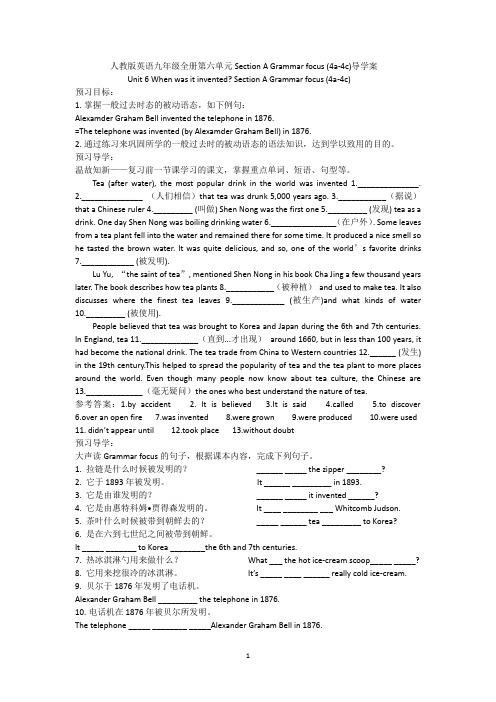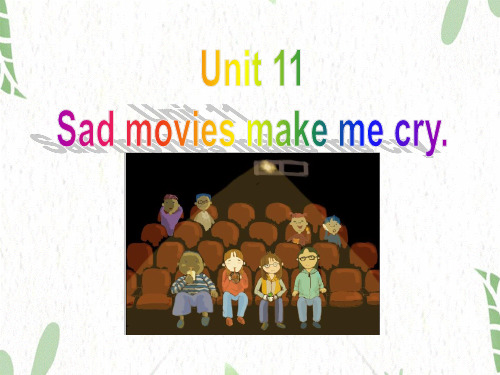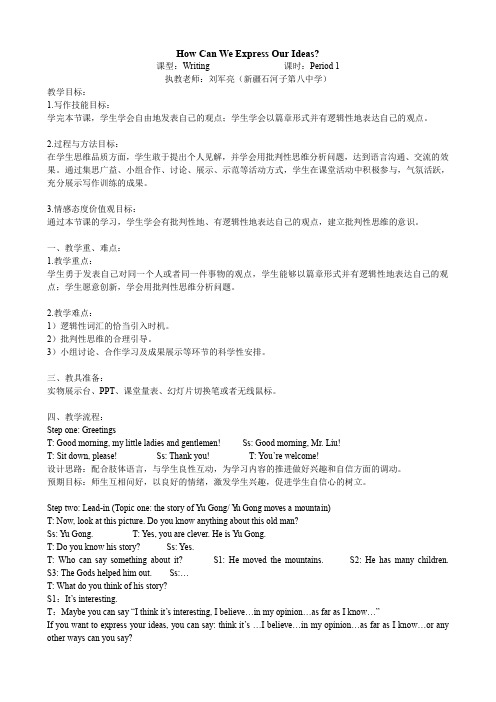SectionAGrammarfocus4a—4b
人教版英语九年级全册第六单元Section A (4a-4c)Grammar focus

人教版英语九年级全册第六单元Section A Grammar focus (4a-4c)导学案Unit 6 When was it invented? Section A Grammar focus (4a-4c)预习目标:1.掌握一般过去时态的被动语态,如下例句:Alexamder Graham Bell invented the telephone in 1876.=The telephone was invented (by Alexamder Graham Bell) in 1876.2.通过练习来巩固所学的一般过去时的被动语态的语法知识,达到学以致用的目的。
预习导学:温故知新——复习前一节课学习的课文,掌握重点单词、短语、句型等。
Tea (after water), the most popular drink in the world was invented 1.______________.2.______________ (人们相信)that tea was drunk 5,000 years ago.3.___________(据说)that a Chinese ruler4._________ (叫做) Shen Nong was the first one5._________ (发现) tea as a drink. One day Shen Nong was boiling drinking water6._______________(在户外). Some leaves from a tea plant fell into the water and remained there for some time. It produced a nice smell so he tasted the brown water. It was quite delicious, and so, one of the world’s favorite drinks7.____________ (被发明).Lu Yu, “the saint of tea”, mentioned Shen Nong in his book Cha Jing a few thousand years later. The book describes how tea plants 8.___________(被种植)and used to make tea. It also discusses where the finest tea leaves 9.____________ (被生产)and what kinds of water 10._________ (被使用).People believed that tea was brought to Korea and Japan during the 6th and 7th centuries. In England, tea 11._____________(直到...才出现)around 1660, but in less than 100 years, it had become the national drink. The tea trade from China to Western countries 12.______ (发生) in the 19th century.This helped to spread the popularity of tea and the tea plant to more places around the world. Even though many people now know about tea culture, the Chinese are 13._____________(毫无疑问)the ones who best understand the nature of tea.参考答案:1.by accident 2. It is believed 3.It is said 4.called 5.to discover 6.over an open fire 7.was invented 8.were grown 9.were produced 10.were used 11.didn’t appear until 12.took place 13.without doubt预习导学:大声读Grammar focus的句子,根据课本内容,完成下列句子。
英语人教PEP版九年级(上册)Unit11SectionAGrammarFocus4a-4b

2. 她的爸爸和妈妈都不喜欢看足球。 Neither her father nor her mother likes watching football game.
3. 父母总是很担心我们的学习。 Parents are always worried about our study.
【温馨提示】 make sb. do sth.的被动结构是sb. be made to do sth.,某人被迫 / 被强制做某事。 e.g. The doctor made Sally lie on the
bed. → Sally was made to lie on the bed by the doctor.
4. 红色使人们吃得更快些。 The color red ______ people _______ faster.
5. 长时间等她使我生气了。 Waiting a long time for her ________.
choices with your partner.
Dear Diary,
June 29th
I thought today was going to be really bad.
To start with, it was cloudy and grey, and
cloudy days make me _fe_e_l_s_a_d_.
make的使役用法
make作使役动词,“使;迫使”。 1) make+sb. / sth.+adj.
使得某人 / 某物 …… e.g. Linda’s words made the teacher very
人教版初中英语《Section A Grammar focus 4a―4b》公开课课件

didn't answer the exam questions very well last week. That
made me_u_n__e_a_s_y. I walked to school with my best friend Holly.
She didn't say much to me. That made me a little_u_n_h_a_p__p_y_. In
What makes you…?
You
happy
want to cry
uncomfortable
angry
nervous
feel like dancing
Student 1
Student 2
Hello, I’m _____. I’m ___ years old. In my daily life ,I like ______. It can make me ________. I don’t like ______. Because it always makes me _____. This is my friend,_____. He/She likes ______. Because it can make him/ her_____. He/She doesn’t like ______. Because it can make him/her_______. _____ is also my friend. He/She___________ _____________________________________ _____________________________________
class, the teacher handed back our exams. That made
人教版初中英语课标版 九年级第四单元Section A Grammar focus 4a—4c-课件

big dogs
snakes
test
Survey Group work
used to be afraid of/ be still afraid of
How many students
The dark
used to be be still afraid afraid of… of…
Being alone flying High places
watched scary movies hates scary movies
didn’t read a lot of books
reads at least six books a year
e.g. Emily didn’t use to eat a lot of vegetables, but now she loves carrots and tomatoes.
Grace
watch a lot of movies
Grace used to watch a lot of TV. She didn’t use to watch a lot of movies.
have curly hair
have stright hair Grace’s mom
Mom used to have curly hair. She didn’t use to have stright hair.
Writing practice:
Please write a letter to Emily, introduce yourself especially your changes to her.
4b Look at the information and write
人教版九年级英语(全一册)Unit 1 Section A Grammar focus 4a—4c 教案

How Can We Express Our Ideas?课型:Writing 课时:Period 1执教老师:刘军亮(新疆石河子第八中学)教学目标:1.写作技能目标:学完本节课,学生学会自由地发表自己的观点;学生学会以篇章形式并有逻辑性地表达自己的观点。
2.过程与方法目标:在学生思维品质方面,学生敢于提出个人见解,并学会用批判性思维分析问题,达到语言沟通、交流的效果。
通过集思广益、小组合作、讨论、展示、示范等活动方式,学生在课堂活动中积极参与,气氛活跃,充分展示写作训练的成果。
3.情感态度价值观目标:通过本节课的学习,学生学会有批判性地、有逻辑性地表达自己的观点,建立批判性思维的意识。
一、教学重、难点:1.教学重点:学生勇于发表自己对同一个人或者同一件事物的观点,学生能够以篇章形式并有逻辑性地表达自己的观点;学生愿意创新,学会用批判性思维分析问题。
2.教学难点:1)逻辑性词汇的恰当引入时机。
2)批判性思维的合理引导。
3)小组讨论、合作学习及成果展示等环节的科学性安排。
三、教具准备:实物展示台、PPT、课堂量表、幻灯片切换笔或者无线鼠标。
四、教学流程:Step one: GreetingsT: Good morning, my little ladies and gentlemen! Ss: Good morning, Mr. Liu!T: Sit down, please! Ss: Thank you! T: You’re welcome!设计思路:配合肢体语言,与学生良性互动,为学习内容的推进做好兴趣和自信方面的调动。
预期目标:师生互相问好,以良好的情绪,激发学生兴趣,促进学生自信心的树立。
Step two: Lead-in (Topic one: the story of Yu Gong/ Yu Gong moves a mountain)T: Now, look at this picture. Do you know anything about this old man?Ss: Yu Gong. T: Yes, you are clever. He is Yu Gong.T: Do you know his story? Ss: Yes.T: Who can say something about it? S1: He moved the mountains. S2: He has many children. S3: The Gods helped him out. Ss:…T: What do you think of his story?S1:It’s interesting.T:Maybe you can say “I think it’s interesting, I believe…in my opinion…as far as I know…”If you want to express your ideas, you can say: think it’s …I believe…in my opinion…as far as I know…or any other ways can you say?S1: I agree... S2: I disagree…S3: I’m sure that…S4: it is + adj.+ to do S5:…T: So I ask you again: What do you think of this story and how do you like Yu Gong.Ss:...T: You have different ideas on the same thing. You are great! Just now, some students said” the story is interesting”, some students said “it’s …”. Different people have different ideas. (Lead students into the listening part) Wang Ming and Claudia are also talking about the story of Yu Gong. What do they think of the story? Do they have the same ideas? Listen!T: Do they have the same ideas? Ss: No!T: What do they think of the story? Open your books, and look at page42 2d. Let’s have a group discussion. Read the conversation/dialogue, find the information and fill in the chart. 2 minutes. Go!Two minutes later:T: What does Wang Ming think of the story? What did he say? Ss:…T: He also gives detailed explanations. What did he say? Ss:…Then, how about Claudia? What does Claudia think of the story?ideas. Look at it, Let’s read my ideas together with me.T: Pay attention to the red words and blue words. I can use different ways to express my ideas, I also use logical words. Do you know how to write?Ss: Yes.T:So, today we are going to talk about this: How can we express our ideas?设计思路:让学生更多地说说愚公移山的故事,哪怕是一句、二句都可以, 引导学生会用I think (I)believe…I’m sure that…I agree/ disagree… it is +adj.+ to do sth等能够表达个人观点的词汇或者句型结构,充分进行语言输入。
SectionAGrammarfocus4a—4b (4)

3a Read the passage. Underline the
different kinds of movies and circle the movie names. What Do You Feel Like Watching Today?
I like singers/ musicians who make us happy/ play different kinds of music.
What kinds of movie stars do you like?
Work in pairs. Ask your partner some questions. You can use these sentences.
4. Many people love music that __h_a_s_(have) great lyrics. 5.He likes groups __t_h__a_t__(that/who)play loud.
6.I d_i_s_l_ik_e__this book because it’s very boring. 7.Your aunt r_m__i_n_ds me of my aunt in Paris. 8.Most old people like g__e_n_t_le and quiet music. 9. He sat in the sofa,r_e_a__d_i_n_g (read)a newspaper. 10.Walking on the beach makes you feel _r_e_la_x__e_d.(放松的)
人教版八年级下册第三单元Section A Grammar focus 4a—4c教案

Section A 3 (Grammar focus-4c)
Step1 Happy beginning Sing a song<You raise me up>.
短语: do the dishes, make the bed, take out the rubbish, fold the clothes, sweep the floor, clean the living room …
句子: 1. Could you please…?
Sure. / Sorry, I can’t. I have to …. 2. Could I …?
3. ___ Could I borrow that book? 4. ___ Could you help me do the dishes? 5. ___ Could you lend me some money? a. Yes, here you are. b. Hmm. How much do you need? c. Yes, sure. No problem. I finished reading it last night. d. Yes, but don’t come back too late. e. No, I can’t. I cut my finger and I'm trying not to get it wet. Game: Timing competition 1. ___ Could I hang out with my friends after the movies? d. Yes, but don’t come back too late. 2. ___ Could you please pass me the salt? a. Yes, here you are. 3. ___ Could I borrow that book? c. Yes, sure. No problem. I finished reading it last night. 4. ___ Could you help me do the dishes? e. No, I can’t. I cut my finger and I'm trying not to get it wet. 5. ___ Could you lend me some money? b. Hmm. How much do you need? 4b Fill in the blanks in the conversation. A: I hate to ____ chores. B: Well, I hate some chores too, but I like other chores.
